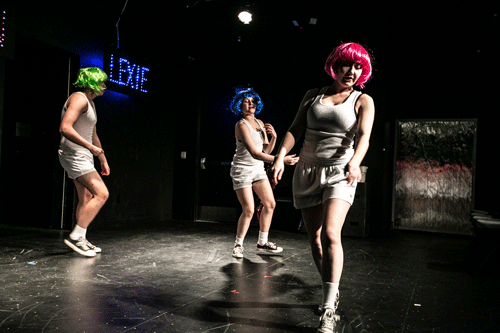
Shared gum, spontaneous song, dance interludes, extremely personal ridicule and physical penalization are all characteristics of the DU Theatre Department’s latest student production directed by Tony Ryan.
“Gym Party” premiered on Sunday, March 2 at 2 p.m. in the Black Box Studio of Johnson-McFarlane and it left the audience suitably uncomfortable.
“Gym Party” is an experiment in audience and actor interaction, and integrates the audience or “group” into the play as the fourth character.
The play is a humorous, unsettling and, at times, chilling exploration of competition and the human desire to win. The play gives the audience the power to influence the outcome of the competition that is enacted throughout the play by the three actors. The play gives the audience the sense that much of it is improvised, partially as a result of its unpredictable and audience-influenced path.
Director Tony Ryan, a junior theater and media studies double major from Larkspur, Colo., first viewed the play when he studied abroad in London and saw a production by the creators, an artist group called Made in China.
“I was captured by the things that they say about competition and what it means to be an audience member and how they keep emphasizing that you can stop the things that are happening onstage,” said Ryan.
The actors function as a unit and seem almost inseparable at first in their matching white workout outfits and blue, green and pink wigs. Each character, however, comes to reveal pieces of themselves during the course of the play, and the audience begins to separate the actors as individuals through a process of revelation and comparison.
The three characters, Lexie, Keegan and Wren, were performed by Alexis Robbins, Keegan Bockhorst and Wren Schuyler, each playing themselves. The play began with the announcement that the actors were there solely to please the audience. Together they compete in three rounds of competition to determine who will be the winner of each performance of “Gym Party.” In this way, acting as an audience member becomes a game of sorts, where the onlooker is simultaneously encouraged to participate but deterred from it by a group mentality that often inhibits individual contribution. Each actor strives to win in hopes of having his or her “name up in lights.”
The first round’s competitions range from long jump to the “marshmallow challenge,” which is won by the actors cramming as many marshmallows into their mouths as possible. Other competitions included pushups, rock paper scissors and the “spin and run.”
The second round of competition delves into the audience’s judgments about each character as they reveal themselves and their individual fears and desires. The audience is asked to make value judgments about each of the characters and vote on questions to determine the winner. At this point the level of discomfort increases, as the audience is forced to participate and voice judgments that usually remain internal.
Each round of competition is followed by physical or emotional penalization of the two losers of the round. During these moments, select audience members meekly implored the actors to stop, having been given a sense of their ability to influence the actors’ actions.
The final round could be won simply by an actor being chosen by the audience as the person they most wanted to dance with.
“Gym Party” is unusual and uncomfortable, and challenges the notion of the passive theatre spectator. Actors make direct eye contact with audience members throughout the play and even go so far as to ask for a spectator’s name and continuously address them throughout the performance. This makes aspects of the play completely reliant on the audience’s willingness to participate.
“It’s interesting to see audiences will be hesitant to even get up to go dance with somebody, let alone stop the things that are happening during this play. You want them to feel what it means to be an audience,” said Ryan.
Freshman theater and German double major Wren Schuyler from Littleton, Colo. was drawn to the play because of its distinctiveness and unpredictability, as well as the challenges it presented from an acting standpoint. She noted that the show’s pacing and having to break the fourth wall and address the audience were new challenges. Schuyler was the victor of Sunday’s performance of “Gym Party.”
“That pure, raw spontaneity that you get from the script and how it is spontaneous but also so planned that you can’t even imagine what is going to happen next, it was that,” said Schuyler, describing what most intrigued her about the play. “That twisted thinking that the script brings to both us and the audience is really what captured me.”
Viewers of “Gym Party” will be challenged and possibly distressed, but will likely come away with a new take on competition and the role of the spectator as well as the power of group mentality. There is no predicting the disturbing end of the play, but by paying close attention to the actors’ ruminations on competition, viewers might be more likely to take action.
“Gym Party” will be showing from March 3 through 6 at 7:30 p.m. in JMAC’s Black Box Studio. Admission is free and seating reservations can be made by emailing dugymparty@gmail.com and specifying your name, performance and number of seats.











